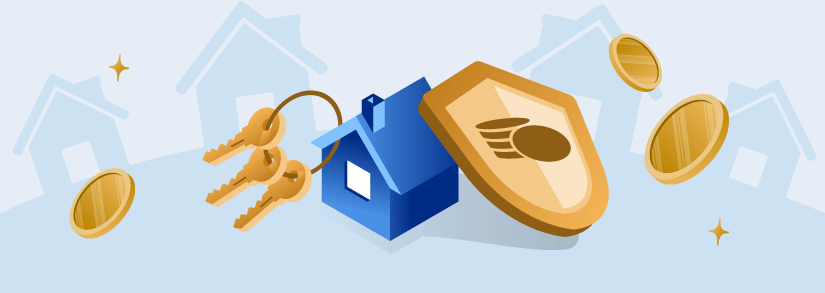What is a Rental Bond and How do I Get it Back?
Need help with your rental bond? In this guide we explain all there is to know about a rental bond, including how to lodge a rental bond online and how to get your rental bond back when you move out. Keep reading to learn this and more in this complete guide to rental bonds in Australia!
What Is a Rental Bond?
After submitting your rental application and signing your lease agreement, you will likely be expected to pay a rental bond.
A rental bond is a security deposit, paid by the tenant to their landlord at the start of a lease, which is meant to be returned at the end of the tenancy agreement when the tenant moves out.
A rental bond gives your landlord or property manager some financial security during your tenancy in the event that you skip paying rent, cause damage to the property, unlawfully break your lease, or otherwise cause your landlord to need to pay out of pocket for an outstanding debt.
Rental bonds are protected by your state or territory’s residential bond authority.
When you start renting and sign your residential tenancy agreement, you and your landlord or property manager will also sign bond lodgment papers, which specify the amount of bond being paid. The bond and signed papers are then submitted to your state or territory’s residential bond authority to ensure it’s protected until the end of your tenancy.

New House? – Get set up now!
Set up utilities at your new home in just one click!
How Much Is My Rental Bond?
The amount of bond you will need to pay at the start of your tenancy differs by state, and how much rent you pay.
Generally, the maximum rental bond payment is a maximum of four weeks’ rent.
However, if your weekly rent is above a certain amount, in some states the total amount of rental bond becomes negotiable between the property manager/landlord and the tenant.
| State | Rent Bond Amount |
|---|---|
| NSW | Maximum 4 weeks’ rent |
| ACT | Maximum 4 weeks’ rent |
| VIC | Maximum 4 weeks’ rent if weekly rent is less than $350. If rent is more than $350 (short-term lease) or $760 (long-term lease) this can be more than four weeks and should be negotiated. |
| QLD | Maximum 4 weeks’ rent if weekly rent is less than $700. If rent is more than $700, there is no maximum amount and should be negotiated. |
| SA | Maximum 4 weeks’ rent if weekly rent is less than $250. Up to 6 weeks if weekly rent is more than $250. |
| WA | Maximum 4 weeks’ rent unless weekly rent is $1,200 or higher, in which case the bond is negotiated. |
| TAS | Maximum 4 weeks’ rent |
| NT | Maximum 4 weeks’ rent |
If you are unsure of how much rent you will be paying, you can ask your landlord or read our guide to the average rent paid in Australia.
How Can I Manage My Rental Bonds Online?
Each state has its own government-run rental bond online management platform established by the states rental bond authority.
You can visit your state's rental bonds online platform to pay a rental bond, view the status of your rental bond, and request a rental bond refund online. In the same manner, your property agent or landlord can manage all of the rental bonds paid to them through this secure platform.
For more information, you can visit your state's rental bonds online platform at the links below:
New South Wales: You can apply for the refund of the rental bond directly online with Services New South Wales if you have an RBO NSW account. If you don’t have an RBO Account you can claim a refund with their Rental Bond Refund Claim PDF.
ACT: The ACT has a platform that is currently only available for agents and renters but will be available soon for tenants to manage their rental bonds through the ACT Revenue website. Tenants can request their rental bond refund by filling out the Rental Bond Form, and emailing it to [email protected].
Victoria: Manage your rental bond online through the RBTA Website.
South Australia: You can manage your rental bond online using your RBO account through the Government of South Australia bonds website
Western Australia: You can manage your rental bond, called a "security bond" in Western Australia, through the Bonds Online website.
Tasmania: You can manage your rental bond refund through the MyBond website if your landlord or property manager does not begin the rental bond refund process within three working days.
Queensland: Manage your rental bond online through the RTA Website
Northern Territory: There is no centralized rental bond platform in NT. However, your landlord must give you your rental bond back within seven business days of you leaving the premises.
How to Get My Rental Bond Back
If it's your first time renting, it may come as a shock that rental bonds can be several hundreds or thousands of dollars. However, for this reason you'll want to make sure you are able to get a rental bond refund at the end of your tenancy.
There are some ways to ensure you get your rental bond back, and what to do if you and your landlord have a dispute over your rental bond refund.
What can I do to make sure I get my rental bond back?
Your best bet to getting your full rental bond back is to keep the property clean, and well maintained, from the start to the end of your tenancy. If this could be a challenge for you, consider purchasing renter's insurance.
At the beginning of your tenancy, you will receive a Property Condition Report, outlining your new home’s condition. It’s always a good idea to take that report and inspect your property when you move in, taking photos and noting any additional damage or issue that isn’t listed in the report.
This will help with any rental bond disputes later on down the road. During your tenancy, keep your home in good condition and report any new issues to the landlord immediately if they occur.
Ways to get a rental bond refund at the end of you rental agreement:
Ensure the property is in good condition. Compare the condition to the Property Condition Report filed at the start of your tenancy. Anything outside of reasonable wear and tear might be charged against you and cause you to lose some, or all, of your rental bond. This can include any types of damage to the property, building, or furnishings left in the apartment.
Check that you have no outstanding debt owed to the property manager. This includes any unpaid rent, or utility bills such as water. Legally, you cannot use your rental bond to pay your final rent, and to do so could result in not getting any of the bond back.
If you’re breaking your lease early, you will need to pay any break fees or other compensation, which cannot be covered by the rental bond. You will need to pay that separately, and then get the rental bond back.
Give back all copies of the keys. If you don’t hand back every copy, the landlord or property manager will need to change the locks which will come out of your rental bond.
What Counts As Reasonable Wear & Tear?
In terms of your rental bond refund, 'reasonable wear and tear' or 'fair wear and tear', vary widely depending on the state or territory you live in.
According to the Queensland Residential Tenancies Authority, fair wear and tear can be defined as:
Normal use and ageing may affect the condition of a rental property over time. At the end of a tenancy the tenant must return the property to the same condition it was in at the start of the tenancy.
Fair wear and tear basically means the things that normal, everyday use of a living space, might cause to deteriorate.
This is different from real, and excessive, damage. The difference between fair wear and tear or damage can be seen below with a few examples:
| What Counts As Wear and tear: | What Counts As Property Damage: |
|---|---|
|
|
How to Apply for My Rental Bond Refund
Since your rental bond was placed in a trust, and protected by your state or territory’s residential bond authority, you will need to go through some bureaucratic channels in order to get it back.
You can apply for a rental bond refund on your states rental bonds online platform, or by submitting a paper claim, via a bond refund form, to your state's rental bond authority.
If you and your property manager or landlord are in agreement on the return of your rental bond, it’s usually your landlord that will submit the refund claim.
Make sure to check your state or territory’s specific laws when it comes to bond rental refunds, how long the refund process will take, and what payment method your refund will be transferred to you.

New House? – Get set up now!
Set up utilities at your new home in just one click!
Rental Bond Disputes: What to Do If Your Landlord Won't Return Your rental bond?
If you and your landlord/property manager don’t agree on refunding your rental bond, your landlord will need to make a claim.
Your landlord will have anywhere from 3 days to two weeks to submit a claim against you depending on your state or territory’s laws regarding rental bonds,
A landlord or property manager can only submit a claim against you if there is:
- Outstanding debt
- Damage
- Missing items
- Cleaning to be done
If you agree with this claim, you can sign off on it and either get some or none of your refund back.
If you disagree with your landlord’s claim, you will need to act quickly, or else your landlord's claim will get filed and the refund processed accordingly.
- Contact your landlord and try to negotiate an agreement.
- If you agree, fill out and sign a new Rental Bond Refund form to get the agreed-upon amount refunded.
- If you cannot come to a new agreement, apply to your state or territory’s Civil and Administrative Tribunal for a hearing request.
To dispute your rental bond refund you can ask for an itemized statement with your landlord’s claims including:
- Quotes
- Accounts
- Receipts
- Bills
- Additional documents or evidence to support their claim
You can also use your copy of the Property Condition Report to dispute the claim.
Frequently Asked Questions about Rental Bonds in Australia
What is a rental bond?
A rental bond is a security deposit paid by a tenant to a landlord or property manager at the start of a lease to cover unpaid rent or damage. It is lodged with the state rental bond authority and refundable at tenancy end, subject to property condition and outstanding payments.
How much is the rental bond in Australia?
The bond is usually up to four weeks' rent but varies by state and rent amount. Higher rents may allow for higher bonds negotiated between tenant and landlord, for example in Victoria, Queensland, and South Australia.
How can I manage my rental bond online?
Each state has an official rental bond online platform where tenants can lodge bonds, view bond status, and request refunds. Examples include Rental Bonds Online (NSW), RBTA (Vic), and RTA (Qld).
How do I get my rental bond refunded?
To get your bond back, leave the property in good condition relative to the initial condition report, pay all outstanding rent and bills, and return all keys. The bond claim is submitted online or through your landlord or agent.
What counts as reasonable wear and tear?
Reasonable wear and tear means normal deterioration from everyday living, like faded curtains or minor carpet marks. Damages like stains, holes, and broken fixtures may be charged against your bond.
What should I do if my landlord refuses to refund my bond?
If there's a dispute, the landlord must lodge a claim against the bond with evidence. Tenants can negotiate, provide counter-evidence (photos, condition reports), and if unresolved, apply to tenancy tribunals for resolution.
Are there recent updates to rental bond laws?
Recent reforms include mandatory digital bond lodgement, quicker refund processing, clearer evidence for claims, and new tenancy protections in some states starting in 2024 and 2025.
Where can I find official rental bond platforms?
- NSW: Rental Bonds Online NSW
- Victoria: Rental Bond Authority Victoria
- Queensland: Residential Tenancies Authority QLD
- South Australia: SA Government Rental Bonds
- Western Australia: WA Bonds Online
- Tasmania: MyBond TAS
Click below to find a better deal for your home!

